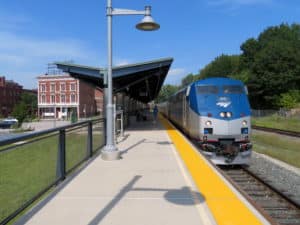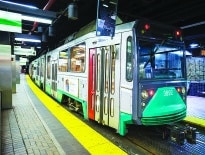
A southbound Amtrak Vermonter train waits at the Holyoke train station. Pioneer Valley officials are pushing for more frequent connectivity between Springfield and Boston, currently served by Amtrak’s once-a-day Lake Shore Limited which runs from Chicago to Boston. Photo courtesy of Pi.1415926535 / CC BY-SA 3.0
A passenger rail extension into western Massachusetts looms as one of the most impactful projects on the table now that Gov. Charlie Baker and federal officials have identified a “path forward” for it, but lawmakers still will not say what – if anything – they will do in the next two months to get the idea off the ground.
Representatives and senators on the Bonding Committee on Wednesday pressed Baker’s transportation and environmental secretaries about features and omissions in a more than $9.7 billion infrastructure bond bill moving on Beacon Hill.
After a lengthy presentation by administration officials delivered at a hybrid hearing in Room A-2, co-chair Rep. Danielle Gregoire called East-West Rail “the elephant in the room” that went unaddressed.
However, neither Gregoire nor her fellow co-chair, Sen. Nick Collins, committed to redrafting the latest version of the bill (H.4798) to make the long-sought project more of a focus or to create the passenger rail authority that Baker and Congressman Richard Neal have said is necessary.
“I don’t know the answer to that yet,” Gregoire told the News Service when asked if her panel would add dedicated East-West Rail funding to the bill or create the new rail agency.
“We have a lot of options on the table right now,” she added, noting the July 31 deadline to wrap up formal lawmaking business for the two-year session. “We have a lot of work to do and not a lot of time to do it. We’ve got eight weeks at this point to get this nine-plus billion dollars out the door. I think everything’s on the table at this point.”
Baker: New Body Needed for Oversight
Baker filed his bill (H.4561) in March and urged the legislature to act expeditiously, calling for prompt action to maximize the impact of a new federal infrastructure law set to steer billions in guaranteed formula dollars to Massachusetts and make even more money available through competitive grants.
The Transportation Committee late last month produced its own redraft (H.4798) of the bill, slightly bulking up its bottom line. Democratic legislative leaders have given no indication of when they intend to bring the bill up for floor votes, but action is expected this month or in July.
Transportation Secretary Jamey Tesler told lawmakers that the bill, filed about a month before the administration and federal officials announced the East-West Rail breakthrough, targets competitive grant funds to drive investment in the project. States must put matching dollars on the table to qualify for reimbursement from any of the new or expanded grants.
“For the purpose of this bill, I would point to the $3.5 billion in competitive matching [funds],” Tesler told Gregoire. “For rail improvements in the commonwealth, including East-West Rail, I would point to that as the target we put in the bill.”
When they announced they had agreed to advance the effort, Baker and Neal described plans for the legislature to create a new rail authority to oversee the extension west of Worcester, where the MBTA’s commuter rail network ends.
Neal at the time said the agreement pivoted on using a pending infrastructure bond bill to create that new authority, but the Transportation Committee did not add any such language to its redraft of the legislation.
An aide said Wednesday that Neal, who chairs the powerful U.S. House Ways and Means Committee and served as mayor of Springfield in the 1980s, “continues to hold conversations with Speaker Mariano, Senate President Spilka, and MassDOT to ensure that this authority is included at the end of year package making its way through Beacon Hill.”
Other States Could Take Train’s Funds
One lawmaker at Wednesday’s Bonding Committee hearing questioned whether standing up a new agency should be a prerequisite to launching expanded train service, saying the Amtrak Downeaster route between Boston and Brunswick, Maine, began running before officials agreed to its permanent governance.
“I’m just wondering: since we don’t need the authority to get the federal money, why take that approach?” said Rep. Lindsay Sabadosa of Northampton.
Tesler replied that Massachusetts faces an “unprecedented environment of competition.”
“There isn’t any clear, bright-line about what you absolutely need versus what you want,” Tesler said. “Do you absolutely need it? I can’t say that. But we’re just trying to give the best advice, and that was the conversation we’ve been having with everybody relative to what we think puts us in the strongest position to outcompete other areas for some of the grants I just mentioned and future grants.”
Commuter Rail Concerns Aired
Lawmakers also floated concerns about funding for commuter rail electrification. Collins, a South Boston Democrat, said he is frustrated that the bill focuses on electric vehicle charging infrastructure and electric bikes but does not go as far on shifting the commuter rail system away from diesel vehicles.
“I don’t know how we can put a bill forward like this that doesn’t ensure that happens now,” Collins said.
In November 2019, the MBTA oversight board at the time voted unanimously in favor of electrifying the commuter rail system and increasing the frequency of train service through the densest corridors.
Transit advocates have grown frustrated in the ensuing years at what they decry as a lack of follow-through on that vote, which came from a panel that has since dissolved and been replaced.
Tesler said Wednesday that the MBTA and MassDOT will need to build out infrastructure before committing to an electrified commuter rail network, similar to the work underway to construct or retrofit bus garages equipped to handle electric vehicles.
The MBTA filed an application for grant dollars to put toward a commuter rail maintenance facility south of Boston, Tesler said.
“In order to move to that future and to address some of your points and others’ concerns, we do need to have the facilities to support that,” Tesler said.
While he was more noncommittal on East-West Rail, Collins told the News Service that his panel is considering ways to push for faster electrification across the MBTA commuter rail network.






